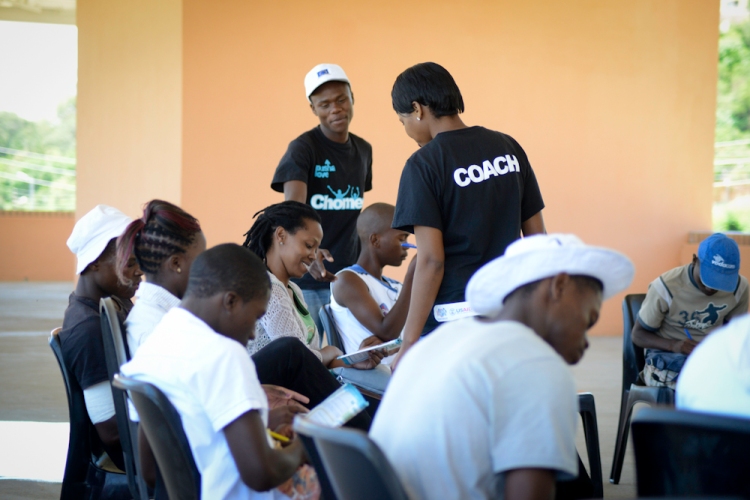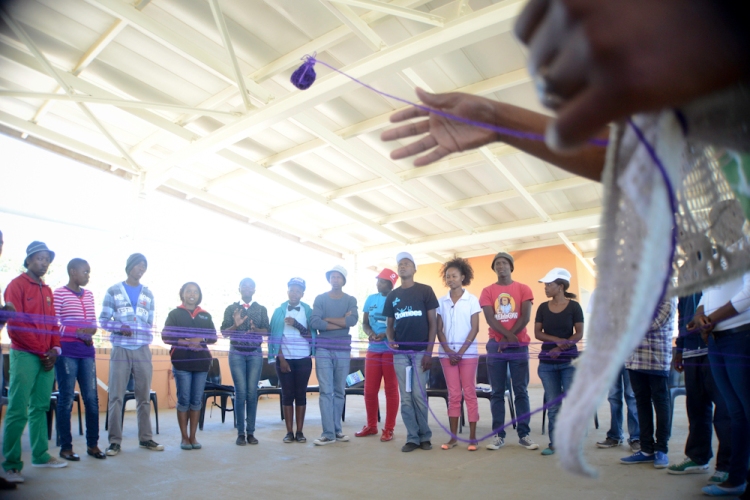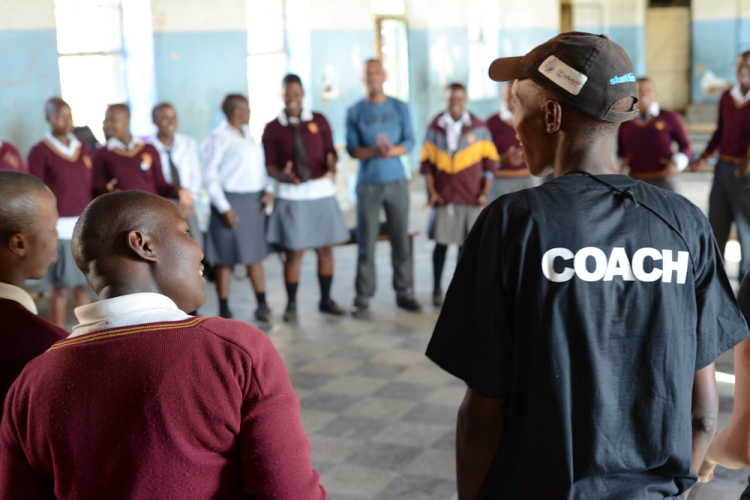Originally posted by Kick4Life
By Leila Hall
It is a hot summer afternoon in Maseru, Lesotho. On the rooftop of one of the buildings at Kick4Life, a group of young people are sitting in a circle with their heads bent, quietly writing. The silence is broken only by the shouts of children playing down below. Three people in T-shirts with the word ‘COACH’ printed in bold lettering across their backs are moving between the seated participants, stopping here and there to have a whispered conversation with somebody in need of a question answered or a point clarified.
The group is in the middle of the tenth and final session of Pusha Love Chomees – an interactive curriculum which teaches key facts about HIV/AIDS and encourages young people to think critically about the society in which they live, their own behaviour, and – especially – about ways to minimise their risk of contracting HIV. In a country in which 23% of adults are infected with the virus (the third highest prevalence rate in the world), educating young people to make choices that will keep them healthy and HIV-free remains at the forefront of Kick4Life’s work in Lesotho.
In this final session, participants have been asked to put learning into action by writing down personal promises that they want to make to themselves and to people close to them. Everybody is invited to stand in a circle. One of the coaches holds a purple ball of wool in his hand. He shares his promise with the group, and then tosses the ball of wool to another coach, who does the same thing. One by one, all of the coaches and participants say their promises out aloud, before passing the ball of wool on.
Before long, a giant web of wool has been created, connecting everybody in the circle. Once everybody has had the chance to share, the coaches help the participants to cut a small piece of wool to tie around their wrists as a reminder of the promises they have made.
Initially designed and piloted as an in-school Youth Club program, the Chomees curriculum was refined in early 2013 to cater specifically for the needs of young adults between the ages of 18-24. In July 2013, Chomees was officially launched as part of Pusha Love – a nationwide behaviour change campaign funded by USAID. Since then, over 3,000 young people in Lesotho have completed the Chomees curriculum.
Chomees coaches are young volunteers who are trained by Kick4Life to deliver the curriculum. There are currently 35 coaches working on the program. Typically, a Chomees group will have anywhere between 15 to 30 participants, and will be led by a team of three to four coaches. For the past six months, in communities across four of Lesotho’s districts, teams of coaches have worked tirelessly to deliver Chomees sessions in a wide variety of locations – from classrooms, to prisons, to youth centres, to one-roomed huts in remote villages.
Recently, the Chomees coaches were invited to share their stories and experiences in writing. What emerged is a unique insight into the program and how it works to positively affect both coaches and participants.
Tebelo Phomane, who has worked with groups of young people in and around communities in Morija and Mafeteng, says that session four of the program is his favourite: “In this session, we talk about where HIV comes from, because most participants don’t know the facts about HIV.”
Moeti Lesupi, who works as a coach in Maputsoe in Leribe, has a different favourite: “I like session nine, where we do ‘The Real Deal Talk Show’ which teaches participants about stigma and discrimination. This session makes participants aware that HIV positive people are not bad people, and that it is sometimes not their fault that they were infected.”
“When we do the Talk Show in session three, we talk about love, sex and relationships,” explains Tšeliso Maboee, who also works in Maputsoe. “These are topics that young people are really interested in. We get asked many questions and we find solutions, and at the end participants know how to face challenging situations. We all learn a lot.”
“The good thing about the Talk Show is that it is funny and entertaining, but also serious”, adds Nthoateng Mphanya, a coach from Mapoteng in Berea.
Coaching is not always an easy job. If they are working in remote villages, coaches are often required to travel long distances and to spend many nights away from home. Having to constantly adapt to people of different backgrounds, personalities and abilities is part of the job, as is the frequent disappointment that comes with sessions that are cancelled or delayed.
But despite the hard work and challenges, many of the coaches reflected on the positive aspects of their job, and especially on the unique and powerful relationship that they build with their participants.
“I love interacting with participants, especially during informal time,” says Senate Letsie, a Maseru coach. “It’s during this time that I get to share my personal stories and experiences with participants and they get to reflect on them. I get to give advice and help my participants to make smart choices.”
“Participants start to believe in me in the sense that they ask for advice from me and ask me to help them tackle their challenges and problems,” says Lesupi. “A lot of participants went for HIV tests because of my advice.”
Phomane adds: “Since I became a Chomees coach, most people in my village respect me and tell me about their personal issues. I have had participants come up to me before and disclose their HIV-positive status to me.”
For many coaches, the positive impact of the program on the lives of their participants is immediately evident.
“After a session, a participant came up to me and told me that after we had talked about healthy relationships and communication skills in sessions three and seven he had built a good relationship with his girlfriend and the community around him,” recalls Selebalo Molefe, one of the Morija coaches.
Mabooe remembers a particular intervention at a high school in Maputsoe: “We were doing session six, which teaches participants about gender roles in Lesotho and how these contribute to the spread of HIV. I talked to the boys about the expectations that we face as young men, and I explained to them the importance of living ‘outside the box’ – of making their own decisions about how to live free of the restrictions of gender roles. They were impressed and their facial expressions showed me that they were ready to change and to live outside the box.”
“At the end of one intervention, a participant came up to us and told us that the sessions had motivated him to work hard to save up enough money to go back to school,” says Mailinyane Lihaba, a coach in Hlotse in Leribe.
But one of the most powerful and lasting effects of the program is the change that coaches see in themselves. Many have become role models in their own communities – a new-found status which has forced them to evaluate their own behaviour and to put into action the lessons that they teach others.
“Coaching acts as therapy in my life,” says Tsotuoe Konyana, a coach in Maseru. “If I have my own personal problems, after I have facilitated a group I feel refreshed. I am a shy person, and the fact that I am now able to stand confidently in front of people is one of the great achievements in my life.”
“Before I became a coach, I had a problem with how I communicated with others,” adds Konyana. “But now, I have good communication with my husband and other people. I apply the communication tips that I teach to my everyday life.”
“I used to have many girlfriends and couldn’t stick to one partner,” recalls Mabooe. “I now only have one partner.”
“Before becoming a Chomees coach, I discriminated people who are HIV positive because I didn’t know the facts about HIV. But since becoming a coach, I support HIV positive people and I teach others to do the same.”
2014 has now begun and Chomees is already off to a good start! We plan to work with many more thousands of young people in the country this year, and to train more coaches to become role models and agents of change in their community.
(If you would like to find out more about the program, or if you live in Lesotho and have a group of young people who you would like us to work with, please do get in touch via email: [email protected] or [email protected]).
Photography by Meri Hyöky












